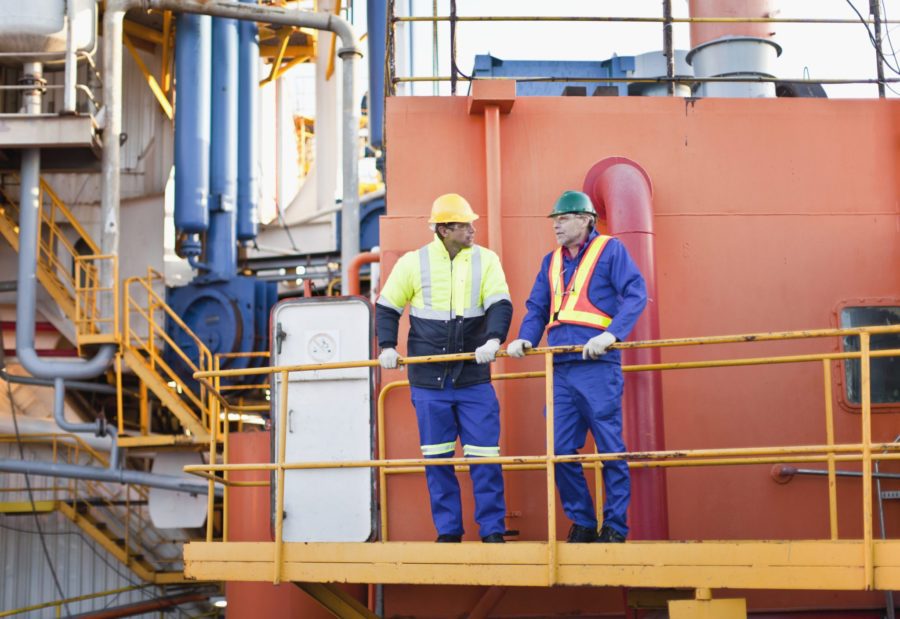Oil and gas surety bonds are financial guarantees that must be purchased when an oil or gas company seeks to obtain a permit or license to drill. Bonds are a way to secure an oil company’s promises to operate according to applicable regulations and to fulfill its other obligations to the state or federal agency that regulates a particular drilling site.
Obligations Secured by Oil and Gas Bonds
Most of the obligations of oil and gas operators are spelled out in regulations that govern the proper methods for drilling and operating a well. The Bureau of Land Management (BLM) or the corresponding state agency will require the oil company to properly open the well, maintain the drilling equipment, dispose of drilling waste, make repairs, cap an unproductive well and return the land to its natural state.
A Financial Contract with Three Parties
Oil and gas bonds are surety bonds that have been tailored to the risk characteristics of the oil and gas industry. A surety bond is a financial contract that has three parties: (1) the principal is the oil company making the promises to perform as required; (2) the obligee is the federal or state agency that will grant the license or permit to drill the well; and (3) the surety is a specialized insurance company that uses its capital to underwrite bonds.
How Bonds Secure the Obligations of the Oil Company
Should the oil company fail to meet its obligations to the regulatory agency – for example, by failing to properly close a retired well and restore the land to its natural state – it could be very difficult for the agency to pursue the oil company and compel it to fulfill those obligations or to seek reimbursement of cleanup costs. In a case where the drilling operator is bankrupt or goes out of business, it could be impossible.
Bonds Protect Taxpayers
In order to protect the taxpayers from such an outcome, surety bonds would provide the funds necessary to properly close the well and restore the land. In such a case, the obligee would submit a claim against the bond with the surety. Upon verifying the claim, the surety would pay the bond to the obligee and then would look to the principal to be reimbursed.
Bonds Are Like Insurance, But Not Quite the Same
In this way, surety bonds work something like an insurance policy. However, instead of insuring against an accident or injury, surety bonds protect the obligee against the financial losses or damages that would arise from a failure by the principal to meet its obligations.
Another difference between bonds and insurance is that the bond premiums are paid by one party (the principal) to a second party (the surety) for the protection of a third party (the obligee). Should the surety have to pay the bond amount to the obligee, it is then entitled to pursue the principal to be indemnified for its losses, as well as court costs and fees.
Bonds Transfer Risk from the Obligee to the Principal
By requiring the oil company to be financially responsible for fulfilling its obligations, surety bonds transfer the risk and cost of any failure to meet those obligations from the obligee to the principal. This means that the safety and environmental interests of the real owners of public lands (the people) are protected by the requirement for the bonds.
With the risk of failure transferred from the obligee to the principal, the oil company has a built-in incentive to operate according to regulations, observe safety rules, properly close a retired well and perform the required reclamation steps before leaving the site.
What agencies require surety bonds?
Many oil and gas wells are on government lands or waters that are owned by the taxpayers and are often regulated by the Department of the Interior, either through the Bureau of Land Management (BLM) or the Bureau of Ocean Energy Management (BOEM). In some cases, an oil or gas well may be located in a state jurisdiction over public property, in which case the license or permit for drilling would be administered by the appropriate state agency. For example, in Texas, they are regulated by the Texas Railroad Commission.
What companies are required to purchase oil and gas bonds?
In most cases, an oil or gas company seeking a drilling license or permit must purchase an oil and gas surety bond. Various other contractors who are called in by the oil company may also need to obtain separate bonds. Other contractors may be oil field specialists who are on the well site as providers of drilling, repair, maintenance, capping or site reclamation services.
In most jurisdictions, oil companies are required to purchase a separate surety bond for each permit. However, in certain states like Texas, an oil company may only be required to purchase a single blanket bond.
Qualifying for Oil and Gas Bonds
When a surety company issues a bond to a contract principal, it is literally betting its underwriting capital that the principal will perform the service as promised. This bet may be more risky or less risky, depending on the type of bond and the qualifications of the principal. Accordingly, surety companies must conduct careful due diligence to evaluate the level of risk for any particular principal and bond.
How a Surety Company Evaluates Risk
In the construction business, bond risks are limited to whether the contractor will finish the job on time, keep to the budget, fulfill all technical specifications, meet expectations for quality and duly pay all of its suppliers, sub-contractors and workers. The surety can make an informed judgment as to whether the contractor will meet these obligations by evaluating its financial condition and prior track record of project completion.
Why Oil and Gas Drilling is Inherently Risky
Oil and gas bonds have several unique elements of risk that make them quite different from other types of performance bonds. Drilling for oil and gas is literally referred to as exploration, which indicates that there is no guarantee of successful oil or gas extraction from a particular well.
The Risk of Failure is High
When a building contractor completes a construction project, there will definitely be a building standing on the site. However, a drilling contractor can prepare a well, erect a rig and diligently drill for resources that are not found or that fail to meet the volume or quality required for a profitable well.
According to the U.S. Energy Information Administration, the success rate for oil and gas wells is about 89 percent. In other words, this means that the rate of failed drilling operations, known as “dry holes,” is about one out of nine wells.
Extended Liability of Oil and Gas Wells
Another element of risk is extended liability. In the oil and gas industry, bonds must protect the obligee much longer than other types of surety bonds. When a builder finishes a building, it is completed, so if there are any issues with quality or maintenance, they are usually immediately evident or will quickly be revealed.
However, an oil or gas well might be operated for many years after the initial drilling, including repairs to the well, deeper drilling and other types of maintenance. The final obligations of the drilling company, such as closing the well and reclaiming the well site, may not be actionable for many years, so this fact must be accommodated in the protection of the bond.
How Oil and Gas Companies Qualify for Bonding
When a principal applies for an oil and gas bond, the surety company is looking for three essential qualifications.
Experience – Every oil and gas company will drill, operate and close many wells over the course of its business. This provides the surety company with a clear business history, making it relatively easy to evaluate the applicant’s record of exploratory success, business acumen, avoidance of legal issues and adherence to federal and state regulations in the operation of its oil and gas wells.
Financial Strength – Just as important as a positive track record is the principal’s financial strength. Oil and gas exploration is both costly and risky. The principal must have the financial resources to weather the occasional setback or legal challenge without risking the survival of the business, and while keeping its commitments to investors, employees and other stakeholders – especially the obligee and the surety.
Credit Worthiness – Along with financial strength, the surety wants to be assured that the principal has a credit rating that indicates a strong record of paying financial obligations. In the event of a claim against an oil and gas bond, the surety must pay out the value of the bond to the obligee and will then look to the principal to be repaid, perhaps in circumstances where there is substantial liability or no income from operations.
How much does an oil and gas surety bond cost?
Oil and gas surety bonds typically cost between three percent and five percent of the surety bond amount. Due to the extended liability and risk associated with drilling operations, the premium must be paid in each year of operation. Along with the bond premium, the surety may also require the principal to pledge personal property as collateral. The drilling operator may receive favorable tax treatment on the cost of bond premiums.
Duration of a Surety Bond
Surety bonds are in effect from the grant of the license or permit throughout the entire life of the drilling project. When a well is retired and the oil or gas company has completed the reclamation of the site, the federal or state obligee will sign a release that formalizes its acceptance of the reclamation of the site and terminates the principal’s further obligations under the bond.
Benefits of Oil and Gas Bonds for All Parties
Oil and gas bonds apply the unique benefits of surety bonding to the high risks and extended liability of oil and gas exploration. For the principal, they provide a way to offer substantial financial guarantees for an affordable premium. For the surety, they represent a solid investment of its underwriting capital in the vibrant, well-regulated oil and gas industry. And, for the obligee, they provide an ideal way to protect the public – the real owners of the lands and waters where oil and gas await discovery.
Looking for an oil and gas bond?
Navigating the landscape of oil and gas bonds and commercial insurance requires a knowledgeable partner. At Higginbotham, we offer tailored insurance and risk management solutions to help your oil and gas business mitigate risk and foster growth.
Take the next step toward securing your business’s future. Contact Higginbotham to discuss your insurance needs and discover how our oil and gas bond solutions can help safeguard your commercial operations.







